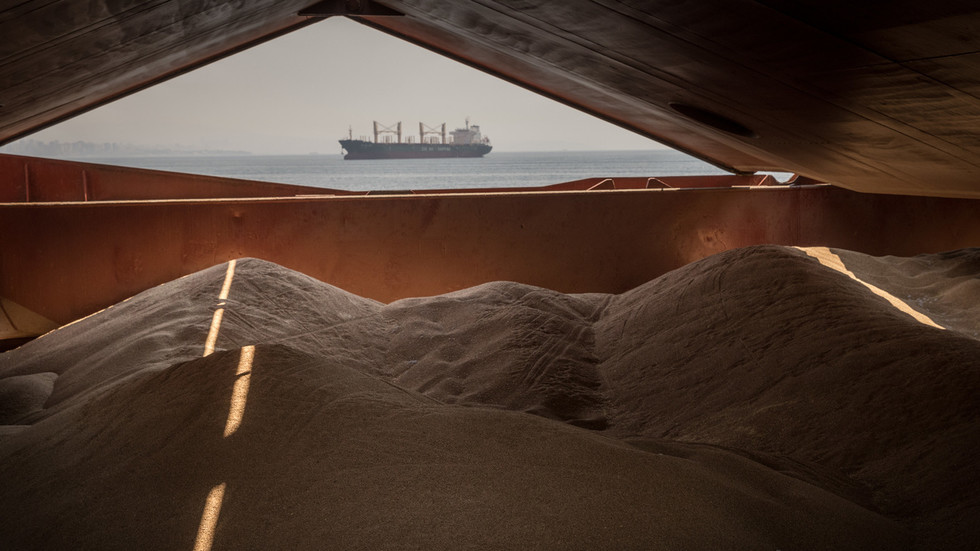
Data shows that most of the produce exported by Ukraine goes to Western Europe, with only a very small amount reaching sub-Saharan Africa

FILE PHOTO: Piles of grain on board a ship during an inspection in Istanbul, Turkey. © Chris McGrath / Getty Images
In mid-May, the UN Black Sea Initiative, widely known simply as “the grain deal,” was extended for another two months, until July 17. However, experts doubt whether this pact, designed to provide the poorest countries with food, will be prolonged any further.
In the final days of May, a scandal broke out around several cargo ships that were blocked in the Black Sea. Six Turkish bulk carriers were unable to leave Ukraine, and even more ships were halted at the entrance to the Bosphorus Strait. Meanwhile, Russia threatened to terminate the agreement.
So what is really going on?
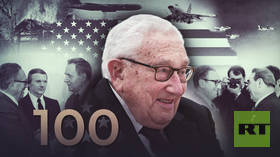
Read more
The war is to blame
The conflict in Ukraine has demonstrated just how fragile globalization can be. As a result of a conflict in Eastern Europe, many external economies have slid into recession, politicians have allocated huge funds from national budgets for aid, global trade has been undermined, and billions of people have been put at risk of having their normal lives disrupted.
The world has so far avoided a major energy shortage. The looming food crisis, however, has become a leading source of concern in the global media. According to the UN, for the first time in decades, developed countries may see a shortage of basic products while the world’s poorer regions may face real famine.
For this reason, a lot of attention is now directed at the deal, which allows grain and fertilizers to be exported from Ukraine via a safe corridor. This is also the reason why so many people became nervous when cargo ships were blocked and stopped sailing.
Mainstream media outlets claim that while Russia selfishly delays the ships and halts navigation at sea, the Ukrainian authorities and the UN are doing all they can to free the Black Sea “road of life” and save the world from famine.
Their version, however, is full of inconsistencies. If the cargo from Ukraine is so vital, then why do experts believe that the Black Sea Initiative cannot solve the global food crisis? And why did EU members Poland, Hungary, Slovakia, Bulgaria, and Romania place restrictions on the import of Ukrainian grain?
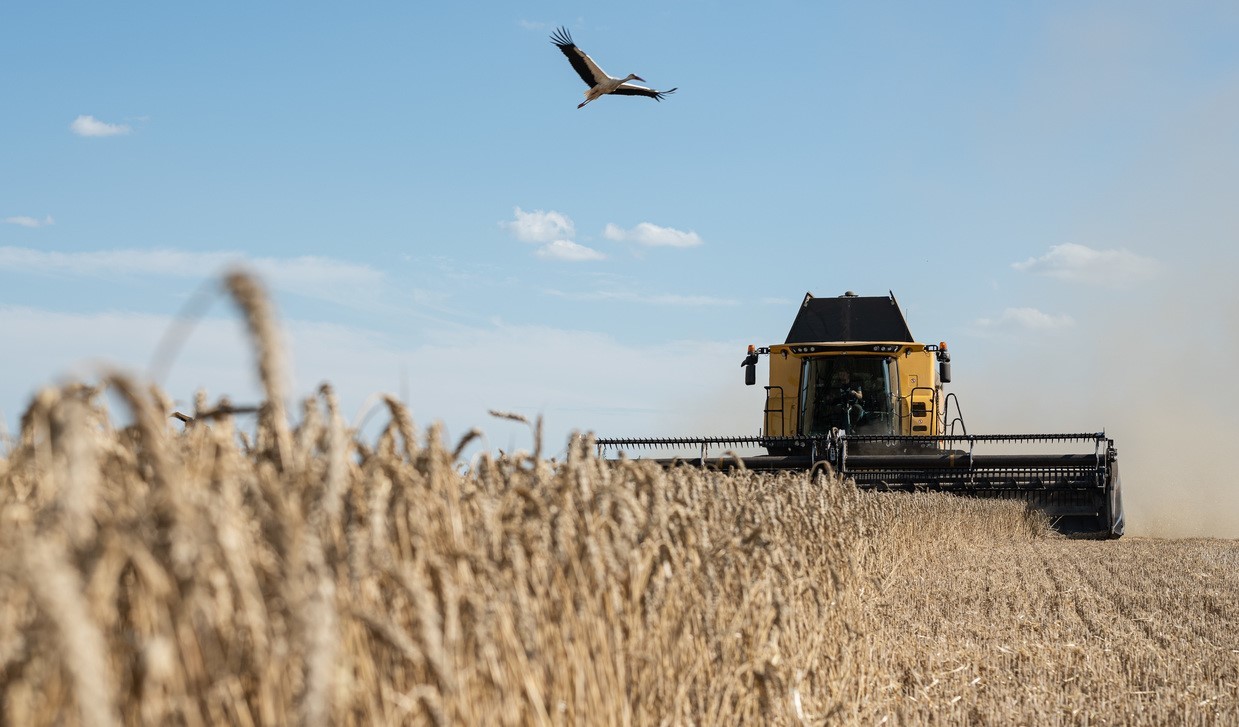
FILE PHOTO. © Alexey Furman / Getty Images
The role assigned to Russia is even more strange. Why would Moscow sabotage a deal that can save one of its key industries? What would it gain from violating agreements with an important partner, Türkiye? And finally, why would it risk new sanctions and make the path to peace even more thorny?
How things got to this point
The Black Sea Initiative came into effect on July 22, 2022. The agreement was signed by representatives of Russia, Ukraine, Türkiye, and the UN. The parties pledged to organize and maintain a safe corridor for the export of grain and fertilizers from Ukraine’s Port Yuzhny and via the Bosphorus Strait in order to prevent a global food shortage.
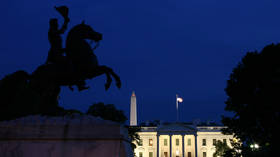
Read more
For its part, Russia has promised not to interfere with the loading and unloading of cargo in the Black Sea, where fighting continues, and not to destroy infrastructure that is critically important for the grain deal. As for Ukraine, the terms of the agreement required it to coordinate shipments with inspectors and not to use the safe corridor for weapons and munitions supplies. Türkiye acted as a mediator and provided most of the cargo ships. The UN also promised to ease economic sanctions imposed on Russia.
A Joint Coordination Center (JCC) – with representatives from Russia, Ukraine, Türkiye, and the UN – was established in Istanbul in order to monitor cargo shipment and sea traffic. The JCC had to ensure compliance with the agreement and inspect cargo ships as they entered and left the ports.
Yuzhny (literally “south) is the biggest deepwater port in Ukraine, and has all the necessary infrastructure for large ships. Coupled with its proximity to the battlefield, this makes the facility, near Odessa, strategically important. However, for the sake of the pact, Russia agreed to lift a maritime blockade and limit the actions of its Armed Forces so they wouldn’t interfere with the transit of ships.
The grain deal ensures not only the export of grain from Ukraine, but also fertilizers and the resources necessary to produce them. This includes ammonia, used for producing nitrogen fertilizers. For most types of grain, these are a lot more important than phosphorus and potash. Without ammonia, the world’s food production would be endangered. For Russia, it was particularly important to resume the operation of the Togliatti-Odessa ammonia pipeline, which was responsible for half of Russia’s ammonia exports. The volumes were huge and met the needs of Estonia, Bulgaria, Finland, Belgium, Lithuania, Spain, Sweden, and other countries.
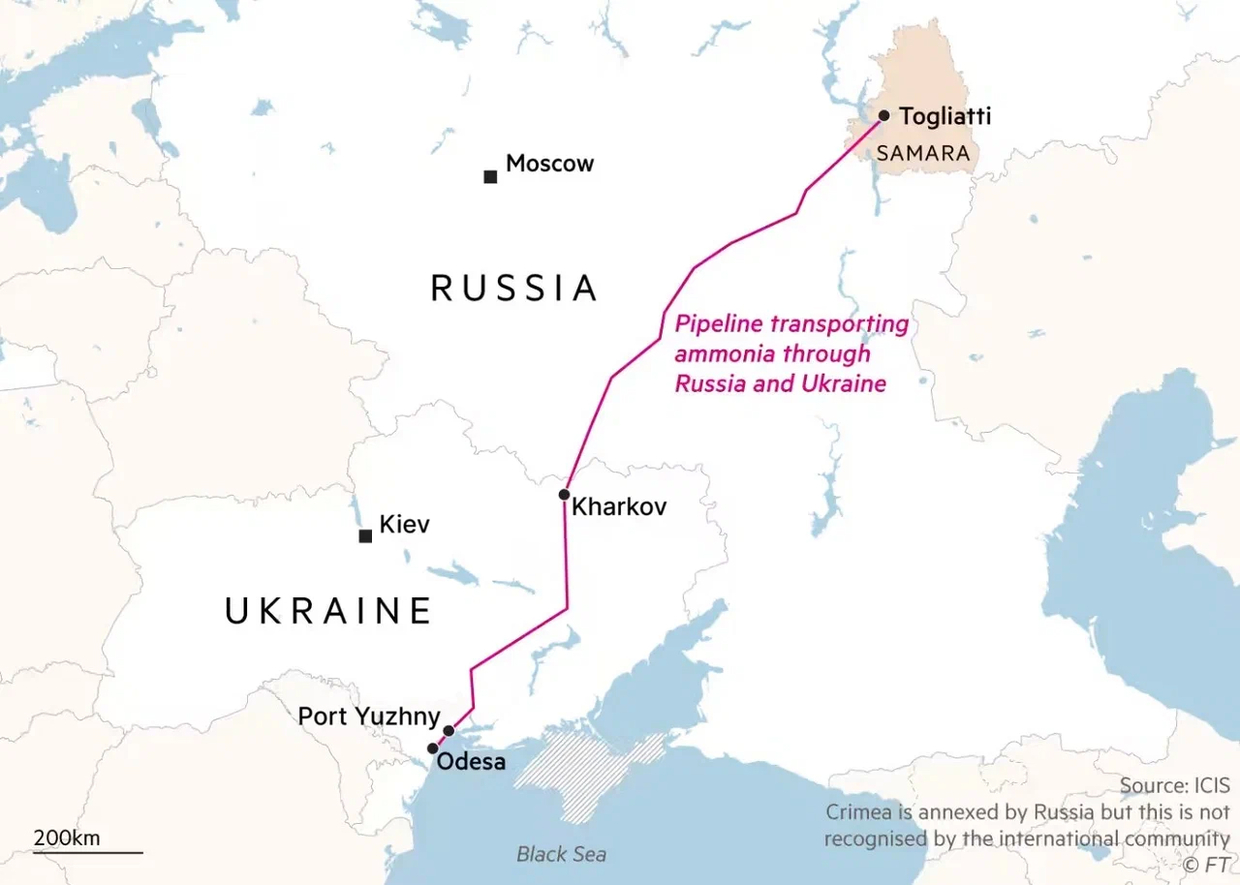
Due to sanctions, Russia’s huge ammonia production industry – the second largest in the world after China – suddenly lost most of its buyers. With the signing of the grain deal in July of last year, this situation was supposed to be resolved.
The grain deal was valid until October 2022. Then came the attacks on the Crimean Bridge and Russian Navy infrastructure in Sevastopol. The Russian Defense Ministry said the ships used for the second attack were stationed in the safe corridor. On the same day, the Black Sea Initiative was halted.
On November 2, the Russian Ministry of Defense received written guarantees from Ukraine that the Black Sea corridor would not be used for military purposes. The pact was resumed and later extended several times.
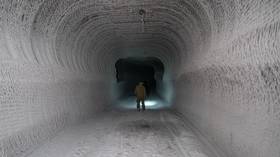
Read more
However, the many problems concerning the agreement itself were never resolved.
A dubious solution to a fixable problem
The mainstream narrative assures us that the grain deal was concluded to avoid the disruption of important supply chains from Ukraine. The armed conflict disrupted the export of grain, and even its storage became difficult and dangerous. Since the whole world could face a food crisis as a result of these actions, all parties agreed on a compromise. But now, Russia is sabotaging the agreement and threatening to disrupt supplies in order to achieve its goals.
In reality, things are a lot more complicated.
Ukrainian agricultural exports are definitely important for the global economy. Before the start of the conflict, Ukraine was the world’s third largest supplier of maize – one of the most important cereal grains. Its production rate was exceeded only by the United States and Argentina. Ukrainian agriculture was quite successful in other aspects as well.
Russia’s agriculture industry, however, easily surpasses it. Russia is one of the global guarantors of food security and the largest supplier of wheat and ammonia – providing 17% and 20% of the world’s total market supply, respectively, before February of last year.
Since then, however, the Russian agricultural industry has been hit by sanctions. The Russian Agricultural Bank – the main payment operator in the agricultural industry – was disconnected from SWIFT, the Western assets of agriculture producers and exporters have been frozen, the supply of agricultural equipment, spare parts, and service to Russia has been halted, and exports have been hit.
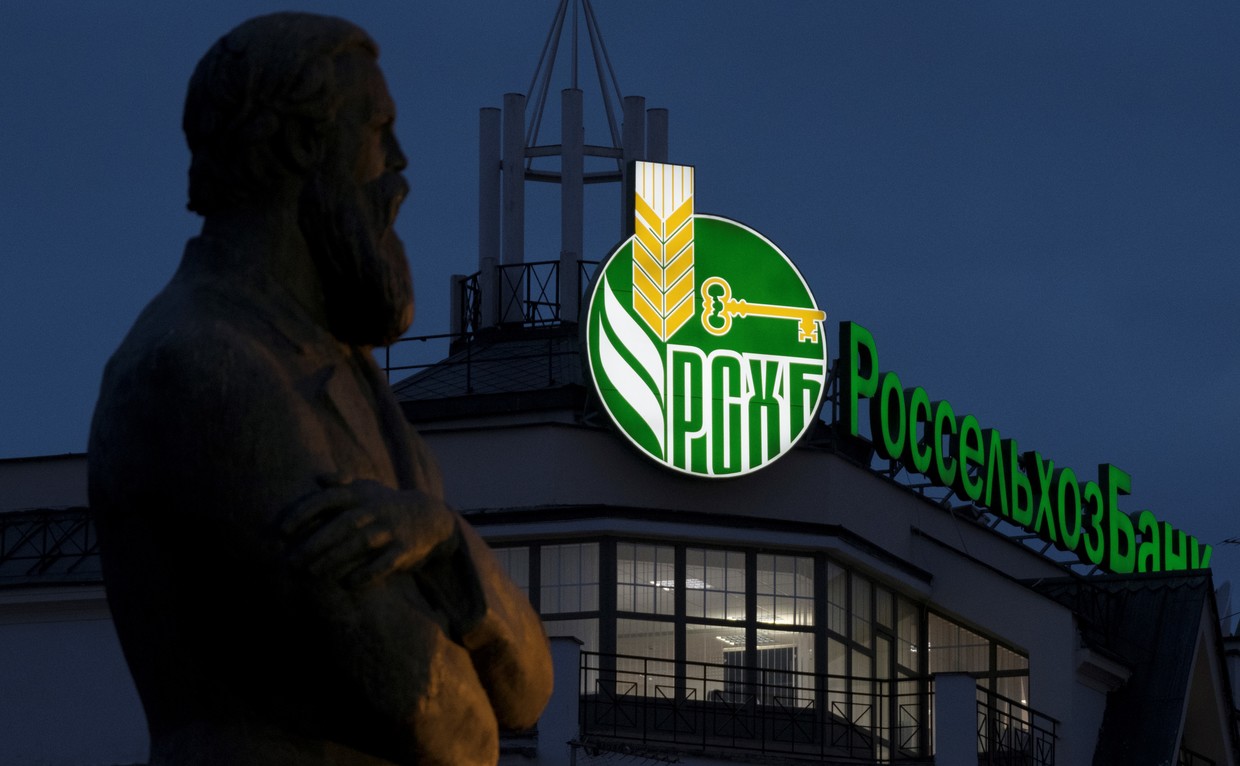
FILE PHOTO: Monument to Friedrich Engels, Moscow. Background: Rosselkhozbank sign. © Sputnik / Maksim Blinov
A bunch of hasty sanctions turned out to be more catastrophic for the world’s food supplies than missiles and bullets. The problems caused by an interruption in Ukrainian grain supplies do not even come close to those caused by the boycott of Russian agricultural products. Agriculture Minister Dmitry Patrushev believes that, given the opportunity, Russian exports could fully replace and exceed those of Ukraine.
In the common interest, but not for everyone
The UN quickly assumed the role of defender of the weak and hungry and said that its mission in the initiative was “to stabilize food prices and prevent hunger that will impact millions.” Unfortunately, the noble plan turned out to be questionable in practice.
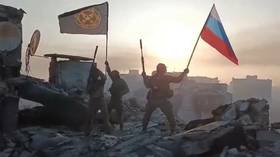
Read more
The UN’s own statistics show that 50% of all cargo exported under the grain deal is sent to other parts of Europe. Another 26% goes to East Asia, 15% is sent to the Middle East and North Africa, and 5% goes to South Asia. Only 2.5% of the grain and fertilizers concerned are dispatched to Sub-Saharan Africa, where about 240 million people lack adequate nutrition.
Instead of aiding a region that already suffers from a severe food crisis recently exacerbated by severe droughts – where, according to some sources, one person dies of hunger every 48 seconds – the UN helps Europeans save money on food, which ensures that politicians don’t lose the support of voters.
The UN appears to be in no hurry to fulfill its obligations to Russia, established in the Memorandum of Understanding, either. Over the past 10 months, Russian producers of agricultural products and fertilizers have not received the promised access to global markets. Apparently, to save the world from hunger, only grain and fertilizers of Ukrainian origin would do. The Togliatti-Odessa ammonia pipeline stands idle as Kiev continues setting new conditions and demands new ports to be included in the pact in order to make control over the shipped goods even more difficult.
As a result of this deal, Russia faces only restrictions, Türkiye can’t do anything with the ships stuck in the ports, the UN has to maneuver between incompatible interests, and the world’s poor struggle to survive. The only beneficiary of the Black Sea Initiative is Kiev. With the help of the UN, for Ukrainian officials the deal turned into a way to make easy money.
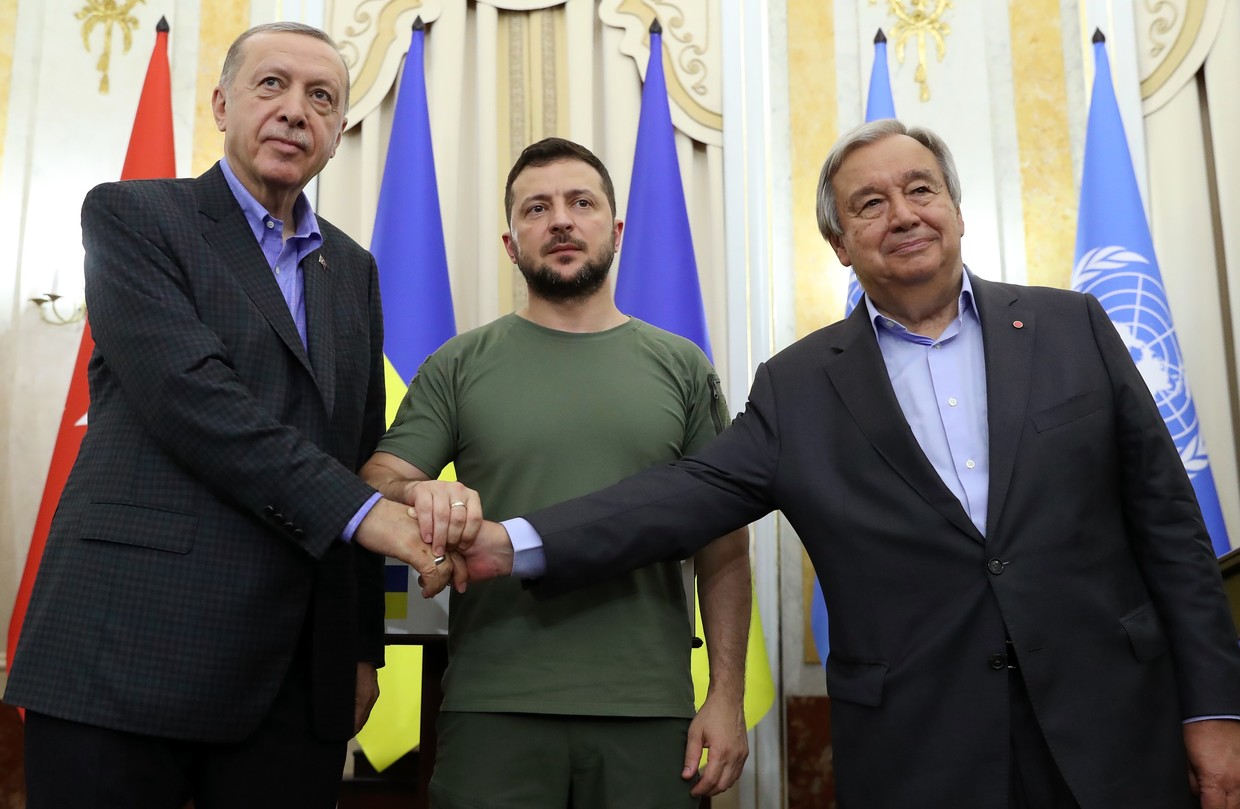
Turkish President Recep Tayyip Erdogan (L), Ukrainian President Volodymyr Zelenskyy (C) and United Nations Secretary-General Antonio Guterres (R) pose during a joint press conference after their meeting in Lviv, Ukraine on August 18, 2022. © TCCB / Murat Cetinmuhurdar / Handout / Anadolu Agency via Getty Images
Seeing that anti-Russian sanctions caused a large niche to open up in the market, Ukraine decided to take advantage of it. While reducing its cheaper exports of maize – a popular staple in poor countries – it increased exports of wheat, sought-after in richer state.
The imbalance has become so striking that Poland, Hungary, Slovakia, Bulgaria, and Romania set restrictions on the import of Ukrainian grain. These countries announced a sudden “thousandfold” increase in grain supplies from Ukraine, and as a result, local farmers could not sell their crops.
Instead of providing vital food supplies that can save lives, Ukrainian officials are busy making money from the crisis.
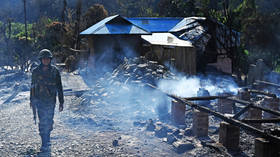
Read more
Dubious Ukrainian tactics don’t stop there, however. A source close to the JCC who wished to remain anonymous, spoke about the pressure exerted on Russian inspectors. “When we refuse to approve the departure of unprepared or non-compliant ships, we are simply held onboard until we give forced consent. Our complaints are ignored, and no one pays attention to our opinion.”
Thus, Russian inspectors are no longer able to check the type and volume of goods being loaded onto the ships in Ukrainian ports.
Ukraine also refused to seek a compromise during the suspension of the deal. The Russian Navy tried to ease the situation and offered to lead the Turkish ships stuck in Yuzhny along another route that is not included in the Black Sea Initiative. The Russian Navy was also ready to clear the sea route of mines and escort the ships.
On May 24, three days before the planned departure, drones attacked the Russian intelligence ship Ivan Khurs, responsible for the security of the TurkStream and Blue Stream gas pipelines. The attack was successfully repelled, the ship safely returned to the naval base in Sevastopol, and the crew received awards. But the command could not risk either their ships or the lives of the crew of a neutral state. As a result, the departure of Turkish bulk carriers was further postponed.
Coincidentally, Ivan Khurs was attacked by British-made drones, operated from Ochakov: a naval center opened and equipped with the help of the United States.
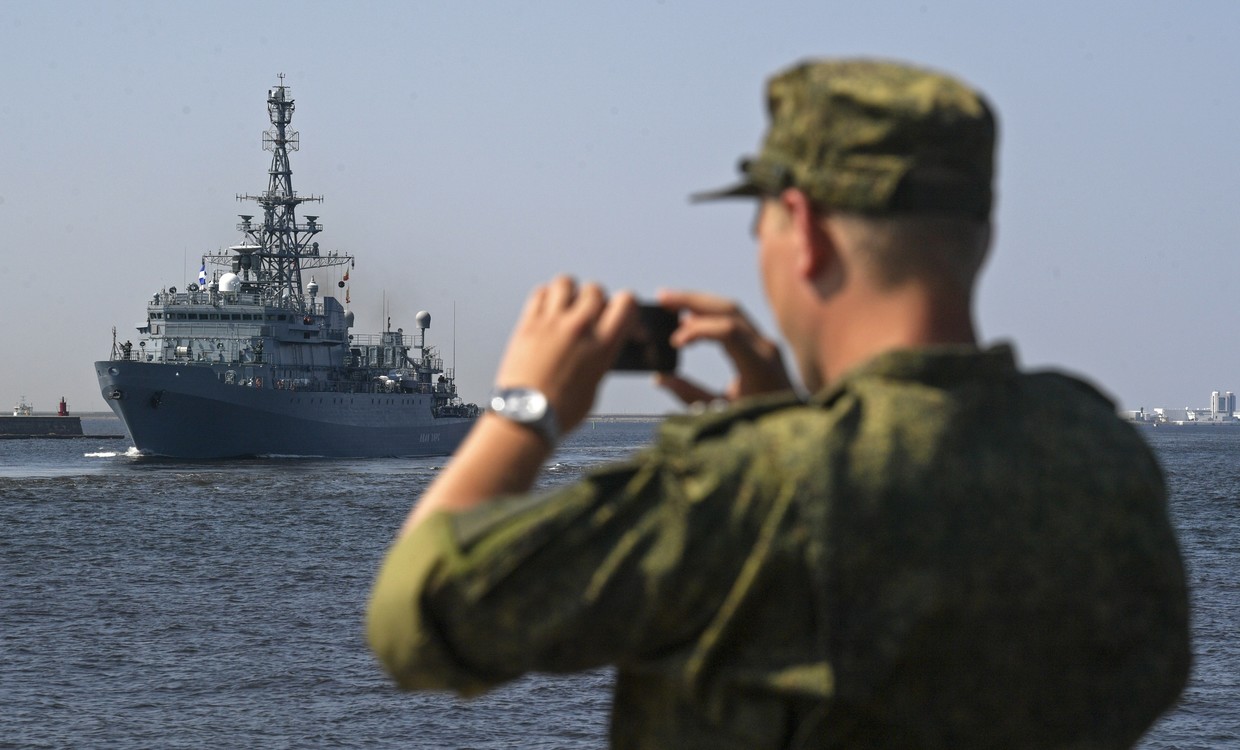
The Ivan Khurs, a Project 18280 reconnaissance ship, during a naval parade rehearsal in Kronstadt to mark Navy Day. © Sputnik / Alexander Galperin
A matter of patience
Despite various provocations and dishonesty in fulfilling the obligations of the agreement, the grain deal was extended for another 60 days. For its part, Russia is ready to stick to its obligations. Of course, Moscow is acting in its own interests – the Togliatti-Odessa pipeline will allow it to return to an important ammonia market, and the restoration of normal trade will help Russian agriculture. Perhaps this can even help balance the currently unstable food market. However, there’s more to the matter than that.
Moscow is not interested in destabilizing the entire world. Famine in Africa can lead not only to mass deaths, but also to a new wave of migration to more developed countries that don’t have food shortages. Given that Europe, of which Russia is the biggest part, barely managed the crisis presented by Syrian migrants, the influx of another – possibly even larger – wave of refugees will lead to unimaginable consequences.
However, the longer the deal remains one-sided and the regulators are biased, the less chance Moscow has of fulfilling its side of the agreement. After all, for Russia, the deal restricts both the army and the economy without any benefits in return.
The words of Foreign Minister Sergei Lavrov best reflect Russia’s position.
“If everything remains as it is, and, apparently, it will, then we will have to proceed from the fact that it (the grain deal) is no longer functioning,”
he said at a recent press conference.
The importers may come up with alternative solutions and try to partially replace Ukrainian supplies. However, to do this quickly and without the help of Russia as one of the main producers of grain and fertilizers in the world will be difficult, to say the least. A mistake like that is bound to come at a high price – not just raising price tags in supermarkets, but spurring a real global crisis.
By Vadim Zagorenko, a Moscow-based journalist focused on international relations and tech




